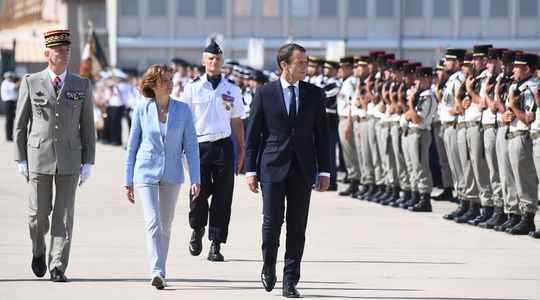A former agent of the DGSE warns us: “Above all, do not present things in an affirmative way! It would put people in danger on the ground.” The action of the French secret services in Ukraine is confidential and must remain so. Our interlocutors also take great care to remain vague about what is the information they have and what they deduce from the usual practices of the departments they know well. “Especially since the Russians read everything!” says one of our sources.
A recent episode dumbfounded the intelligence community: on March 3, Serguei Lavrov, the Russian Foreign Minister, publicly mentioned “a French journalist […] who went to Donbass”, observed “shelling of schools”, and would have been censored by the French authorities. The head of diplomacy was referring to Anne-Laure Bonnel, a French journalist with analyzes close to those of the Russians , which appeared on CNews two days before, hence the feeling among spies that every line in the newspapers, every minute on the streaming channels, is now being dissected for the purpose of recovery by Moscow.
One thing seems certain: if, officially, France does not intervene in Ukraine, since such a presence would make it a “co-belligerent”, our country is indeed active. Part of his actions are public: deliveries of arms have been admitted by Florence Parly. Before the Senate on March 1, the Minister for the Armed Forces specified that it was “protective equipment and fuel, but also missiles and ammunition”. The deputy of Seine-Saint-Denis (La France insoumise, LFI) Alexis Corbière, member of the Defense Committee, confirmed to him on March 9 the sending of “bulletproof vests and some anti-tank missiles”. This information was given eight days earlier by Martin Briens, the minister’s chief of staff, before the members of this commission, and was described as “confidential”, without being covered by defense secrecy.
“Big ears” and presence on the ground
That’s not all. There is the use and transmission to Ukraine of satellite images, analyzed by the Directorate of Military Intelligence (DRM), which specializes in this. “Thanks to satellite intelligence, the DRM will obtain information on the movement of Russian units, their type of armament, where their bases are located. They are the ones who are closest to the ground, who learn about the state of the fighting, the civilian losses”, describes Olivier Mas, ex-colonel of the DGSE. This service is also able to let its electronic “big ears” hang around the front line. “Conversations between Russian fighter pilots are not necessarily all encrypted,” notes Pierre Conesa, a former senior official at the Ministry of Defense.
What about ground troops? A former member of the DGSE makes no secret of it, this type of intervention is part of the know-how of his former “box”: “If the President of the Republic has decided it, it is certain that we have projected elements of the Action service”. Present undercover, these agents hide their true identity. Some of them speak Ukrainian and are able to “instruct the Ukrainian military on the equipment delivered”, on the job, our source tells us. This Sunday, March 13, the Ukrainian Defense Minister confirmed the presence of “foreign instructors” at a military base near Lviv. Without specifying the nationality of these trainers, targeted by a Russian bombardment.
Several “pairs”, positioned in hideouts, could also be responsible for “the protection of President Zelensky and his entourage”. The paratrooper center for specialized training in Perpignan, one of the three components of the Action service, is particularly suitable for this mission, since the soldiers there are specialized in urban combat, guerrilla warfare and insurrection. Foreign Minister Jean-Yves Le Drian seemed to gauge this hypothesis on February 25 on France Inter, in response to a question about Volodymyr Zelensky’s security: “We are in a position to help him if necessary.”
Olivier Mas imagines that certain “intelligence for action” operations could also be carried out clandestinely by the DGSE: “We call that obstructive actions, it’s about stopping terrorist actions, stopping arms deliveries. Another of our interlocutors evokes, him, the support of the 13th regiment of the parachute dragoons, expert of the human intelligence on zone of crisis, intended for the DRM or the command of the special operations. In this scenario, our experts estimate that there could be some “100 to 200” members of the French secret service in Ukraine today.
